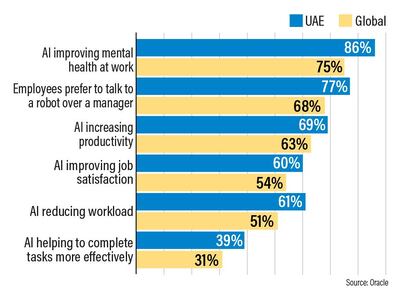More than eight in ten people worldwide are reporting higher levels of anxiety and depression at work this year, but many are willing to turn to technology to help, according to a new study.
Some 86 per cent of UAE respondents to a survey by software firm Oracle and consultancy Workplace Intelligence were reporting higher levels of stress and anxiety as a result of the Covid-19 pandemic, with 41 per cent citing higher stress levels, 39 per cent reporting deteriorating work-life balance, 29 per cent experiencing burnout, 33 per cent claiming depression from a lack of social interaction and 19 per cent also expressing loneliness.
Remote working was cited as a challenge by 94 per cent of respondents, with the biggest factors being no distinction between personal and professional lives (cited by 39 per cent) and dealing with increased mental health challenges like stress and anxiety (34 per cent).
“With new remote work expectations and blurred lines between personal and professional lives, the toll of Covid-19 on our mental health is significant – and it’s something that workers across every industry and country are dealing with,” said Dan Schawbel, managing partner of Workplace Intelligence.
The majority of respondents also expressed a preference to use technology to deal with mental health issues, with 77 per cent of UAE respondents stating they would prefer to talk to a robot over their manager about stress at work, higher than the 68 per cent global average. Respondents cited a belief that robots provide a judgment-free zone (35 per cent) and an unbiased outlet to divulge problems (35 per cent).
The technologies they would like to see include self-service access to health resources, on-demand counselling services, proactive health monitoring tools and access to wellness apps and chatbots.
More than 12,000 responses globally were gathered to the survey, of which 929 were in the UAE. The survey took place between July and August.
The pandemic has elevated mental health not only as a broad societal issue, but a top workplace challenge, according to Emily He, a senior vice president at Oracle.
“There is a lot that can be done to support the mental health of the workforce and there are so many ways that technology like AI can help,” she added.
Organisations need to add mental health to their agenda, Ms He said.
“If we can get these conversations started, both at an HR and an executive level, we can begin to make some change … and the time is now.”
The UAE, a hub for start-ups and venture capital in the Arab world, is projected to benefit the most in the region from AI adoption. The technology is expected to contribute up to 14 per cent to the country’s gross domestic product – equivalent to Dh352.5 billion – by 2030, according to a report by consultancy PwC.
In the survey, six in 10 UAE professionals said that AI has helped them to shorten their work week and allowed them to take longer vacations, against a global average of 51 per cent. Nearly 60 per cent of local respondents said AI has improved job satisfaction and overall well-being, compared to 54 per cent globally.

Almost 86 per cent of UAE respondents said artificial intelligence had also improved their mental health at work, against a global average of 75 per cent, the survey said. Respondents cited AI's ability to offer the right information (39 per cent), to automate tasks (35 per cent) and to reduce stress by prioritising tasks (37 per cent).
Workers in India and China (both 91 per cent) lead the world in terms of trusting robots over their managers, followed by the UAE (77 per cent), Korea (74 per cent) and the US (67 per cent).



